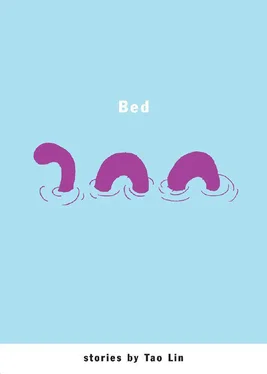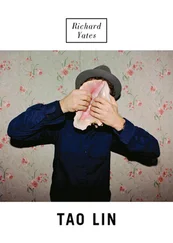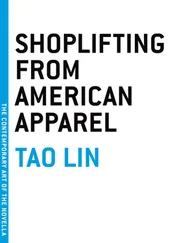Tao Lin - Bed
Здесь есть возможность читать онлайн «Tao Lin - Bed» весь текст электронной книги совершенно бесплатно (целиком полную версию без сокращений). В некоторых случаях можно слушать аудио, скачать через торрент в формате fb2 и присутствует краткое содержание. Год выпуска: 2007, Издательство: Melville House Publishing, Жанр: Современная проза, на английском языке. Описание произведения, (предисловие) а так же отзывы посетителей доступны на портале библиотеки ЛибКат.
- Название:Bed
- Автор:
- Издательство:Melville House Publishing
- Жанр:
- Год:2007
- ISBN:нет данных
- Рейтинг книги:5 / 5. Голосов: 1
-
Избранное:Добавить в избранное
- Отзывы:
-
Ваша оценка:
- 100
- 1
- 2
- 3
- 4
- 5
Bed: краткое содержание, описание и аннотация
Предлагаем к чтению аннотацию, описание, краткое содержание или предисловие (зависит от того, что написал сам автор книги «Bed»). Если вы не нашли необходимую информацию о книге — напишите в комментариях, мы постараемся отыскать её.
Bed — читать онлайн бесплатно полную книгу (весь текст) целиком
Ниже представлен текст книги, разбитый по страницам. Система сохранения места последней прочитанной страницы, позволяет с удобством читать онлайн бесплатно книгу «Bed», без необходимости каждый раз заново искать на чём Вы остановились. Поставьте закладку, и сможете в любой момент перейти на страницу, на которой закончили чтение.
Интервал:
Закладка:
For dinner the dad is made to eat a bowl of steamed vegetables. He has high cholesterol and is not allowed to eat shrimp or egg yolk. He sometimes complains, but is generally docile and obedient. “Poodles are natural water dogs,” he says. “In France, they live in the rivers. Caves of them. Lined up and ready. They ascend one by one. They bob skyward, like penguins. They paddle carefully, heads up, barking at a polite and tactful volume and timbre. People toss them food.” The dad chuckles. He has amused himself. “A river crammed with poodles,” he says. “Imagine that. Have salmon, then have poodles instead of salmon.” He falls asleep on the carpet by the television. He sleeps with his mouth open. His teeth are crooked in a lightly shuffled way and smell of hot summer weeds.
Christmas, the mom has her camcorder. The poodles have their own presents. Neon flea collars, a rubber cheeseburger, a rubber foot! The Christmas tree is plastic and has, mysteriously, over the years, turned from a dark green to a bright and fiery orange. The dad is sheepish and aloof. He has never bought anyone a present. It is just something that he doesn’t do; something about his childhood. He doesn’t seem to understand. He is an inventor. He leaves the room for a moment. He comes back carrying a big gift-wrapped thing. He sets it on the ground. “Hurry,” he says. “Who’s it for?” says Paul. “You,” says the dad. Paul opens it. It is their two toy poodles. The poodles look around, then move carefully away. The dad almost falls to the carpet. He laughs a kind of laugh that none of them have heard before.
Mattie goes to college in New York City, where she takes too many creative writing courses.
She dislikes enjambment, symbolism, the Best American Poetry series. She writes indignantly, with a kind of whirlpooling impatience. Though sometimes she imagines that her hair is white and fluffy, and then she writes cutely, with many l’s, as if to a future granddaughter of hers — some mute and dreamy girl, in a future, enchantless world, without trees or sidewalks.
In Mattie’s head, she critiques other people’s critiques of her work.
“I have no idea what I’m doing here,” she says to classmates. “In college, I mean. Do you?”—here, she likes to lean in close—“Do you know?” One night, she steps off the curb into the street. There is a breeze and her hair sweeps across her face. The street is calm and quiet; there seem to be no other people around. She closes her eyes. A bus that is two buses, swingy and accordioned, comes at her. The bus does not honk. She very slowly opens and closes her eyes, and then crosses the street. She sometimes wonders if she died that night. She remembers the wind, the lightless blacktop, the phantom bus that does not honk.
After college, Mattie stays in New York.
Paul is now in Boston, for his own college education. “I used to walk home to my apartment thinking about crying,” he writes in email to Mattie — the mom has encouraged her children to email one another—“three in the morning. Carrying bags of groceries. Finally, I’d cry a little. It was a long walk. I’d put everything into the refrigerator including the plastic bags and go to sleep. In the morning, I’d eat four bowls of Frosted Flakes, go back to sleep. But that gradually stopped. That time of my life. Today, I am changed. Tolerance, life, it moves you to the center of things. How have you been?”
“Then it kills you,” writes back Mattie. She likes Paul. They get each other. They do. “It moves you, then it kills you. It says, ‘Move here,’ then kills you. It puts its hands on your shoulders, moves you, kills you.”
Once, they see each other. In Barnes and Noble by Union Square. Mattie sees Paul first, a passing glimpse, the recognition coming a few seconds later. She becomes confused — Paul should be in Boston — and, for a long while after, does not trust herself, feels vaguely that she has suffered some kind of cosmic accident. Is she in Boston? What does that mean? To be in Boston? Later, Paul sees Mattie as she is going down the escalator and he is going up. They seem to look each other in the face. Mattie has an abstract expression, and Paul thinks of screaming her name, but then thinks that that would be a bit ridiculous. Later, he thinks of just saying her name, at a normal volume. Of course, he thinks. They don’t ever mention this to each other and, over time, begin to doubt that it happened.
The dad is one day accused by the government of having released false and misleading press releases. It has to do with the company he has founded for his inventions.
In the courtroom, the jury is working-class, weary, and stadium seated — to one side, like one of those multiple missile launchers. The dad’s lawyer has not had a good childhood, and now, in adulthood, is often depressed, shy, and nervous — nevertheless the dad trusts him.
The government lawyer is daunting and loud.
In low-security federal prison camp, the dad is productive and healthy. He makes many friends. The inmates are sanguine and witty; ninety-percent are in for drugs. They debate, cook, play poker and ping-pong, watch TV, work out, plan future criminal activity, make criminal connections, study law.
The dad is to be there for seventy months.
The mom visits twice a week. It is a two-hour drive. “Did you feed the dogs?” says the dad. “Dogs are people too.”
They talk on the phone. “Don’t tattle,” says the mom. She has written down a list of things that the dad should not do. “Don’t complain, don’t spread rumors.” She goes to sleep very early now. Her dreams undergo change. They begin to occur nightly — fully formed, with beginnings, middles, and ends. They have subtle plotting and good dialogue.
In the daytime, the mom walks around the house with a new excitement. In emails to her children, she expresses amazement at her own brain. She feels a bit powerful. “I dream every night,” she writes, “how about you?” In one dream, the family goes on a Bahamas cruise, has a great time. The mom swims in the dream, though she cannot swim in real life. At dinner in the dream, the mom glances across the hall, notices a girl who has very small teeth, goes over there, asks the girl to open her mouth, and wow! The girl has many layers of teeth — thousands! The mom tells her so, and everyone laughs.
In the morning, the mom looks into and buys four cruise tickets, for when the dad is released from prison.
She and the dogs, walking around the house, sometimes cross paths. They look at one another, make sure not to collide, and continue on to where they are going. Though sometimes the mom blocks the dogs, shunts them into corners — or follows them, at a distance. Mostly, the mom finds, the dogs just walk from one room to another, where they then lie down, sphinx style — a style they have recently taken to for some reason.
Summer nights, when it is black and hot and humid outside, the mom gets a little confused. She gets a panicked feeling that the dad, Mattie, and Paul have all, a long time ago, run off with Scarlet Leysen. She forgets the names of the days of the week. She feels ageless and illusory. She is afraid that she will wake one night and find that her pillow is a dismembered torso, that she has murdered a person! She fears the poodles, that there are two against her one, fears the team of them, the ready conspiracy of them. One night, she hears noises. She turns on all the lights, moves quickly to the sofa, lies on her side, turns the TV to the Weather Channel — the least scary channel, she knows — and thinks hard about Mattie, Paul, and the dad, gets them all talking in her head, then calls softly for the poodles.
In prison, the dad has obtained three patents, published eight papers — through collaboration with the mom — and begun to read Chuang Zhu, other Eastern Philosophers, and books on death. He writes to Mattie and Paul. “I am doing an aerobics class two times a week. I am in charge of a team of people. We dig up grass, plant grass, do things with grass. My daily routine is—” and it says his daily routine.
Читать дальшеИнтервал:
Закладка:
Похожие книги на «Bed»
Представляем Вашему вниманию похожие книги на «Bed» списком для выбора. Мы отобрали схожую по названию и смыслу литературу в надежде предоставить читателям больше вариантов отыскать новые, интересные, ещё непрочитанные произведения.
Обсуждение, отзывы о книге «Bed» и просто собственные мнения читателей. Оставьте ваши комментарии, напишите, что Вы думаете о произведении, его смысле или главных героях. Укажите что конкретно понравилось, а что нет, и почему Вы так считаете.












